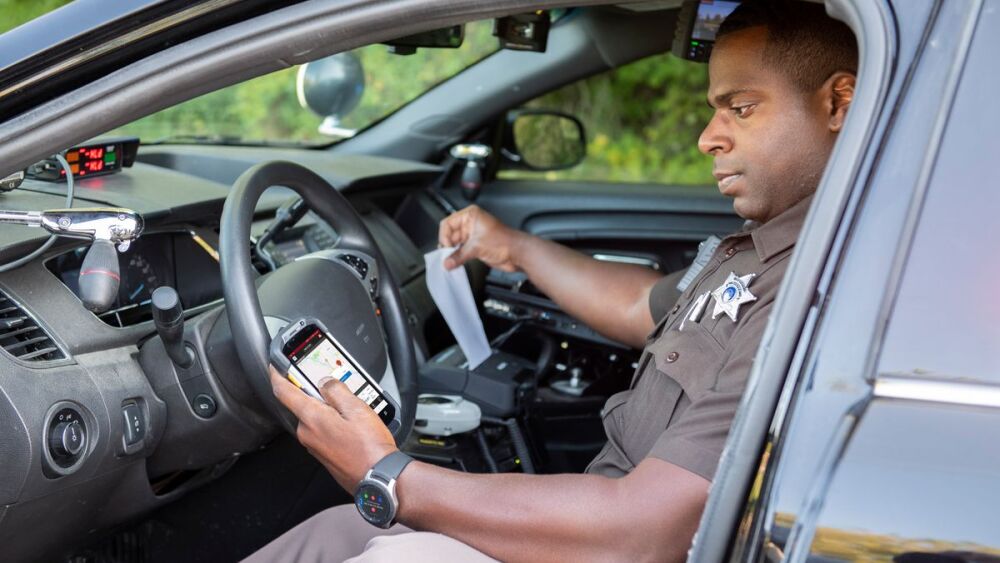By James Careless
By migrating functionality to handheld mobile devices, police communications and report writing have been revolutionized. Now it is time the law enforcement profession does the same for speeding tickets, warnings and other roadside law enforcement forms that have been traditionally handwritten on paper pads.
In many jurisdictions, this move has already happened through the adoption of electronic citations. In this model, the forms an officer needs to write a citation are stored electronically in the cloud. All the officer has to do is select the form they need (like a speeding ticket), call it up on their mobile device, fill it out using the onscreen keypad, obtain signatures, and then save the citation.
From there, the citation information is forwarded to the appropriate databases; not just traffic management, but driver’s license records, the judicial system, fines tracking and anyone else who needs access to such data. With this functionality, the process of electronic citation management is simplified and streamlined for police administrators.
Electronic citations are a key element in Tyler Technologies’ app-based Enforcement Mobile suite, which runs on smartphones, tablets and laptop computers. With Enforcement Mobile, patrol officers can use the same app to write citations and parking tickets, record/report accidents, and carry out many other functions that they used to do with pen and paper.
And since Enforcement Mobile can be integrated with a range of court and public safety systems, it relieves officers of the need to re-enter the same information into various record-keeping systems.
Five benefits of electronic citations
Tyler Technologies’ approach to electronic citations, as supported by its Enforcement Mobile suite, offers many benefits to police departments:
-
The flexibility of the Enforcement Mobile platform makes it easy for departments to create electronic forms that resemble their paper counterparts. This reduces the learning curve for patrol officers because the electronic citations they call up on their devices look the same as the ticket pads they’re accustomed to. At the same time, police supervisors can ensure that these electronic citations conform to all departmental processes and judicial rules of evidence. They can also be confident that the data captured by their officers is readily available for after-incident review by anyone with the proper authorization.
Worth noting: Tyler Technologies hires retired police officers to consult on Enforcement Mobile’s design and layout as well as provide hands-on training. This maximizes the usability of the platform by active police officers.
- The availability of drop-down menus and rapid data entry features make it easy for officers to populate electronic citations quickly and accurately, while the platform’s ability to duplicate driver and vehicle data where necessary reduces human input errors. It helps that data associated with driver registrations and VINs can be scanned and sourced using Enforcement Mobile and then automatically added to the citation. This reduces officer workload while ensuring adequate documentation for police and court records systems. Enforcement Mobile’s intelligent adaptation of data rules further reduces user errors and ensures that the saved and printed record is complete and accurate.
- The fact that electronic citations are far faster and easier for officers to fill out speeds up the roadside stop process, which is a major boost to officer and civilian safety. The longer both stay on the side of the road during a stop, the more vulnerable they are to being hit by oncoming traffic.
- Tyler Technologies’ Enforcement Mobile suite is device agnostic. This means that it will run on Apple iOS, Android and Windows equipment, allowing police departments to adopt this platform and run it on their existing handheld/computing devices. Not only does this save users the expense and hassle of buying new equipment and then provisioning it to support electronic citations, but it also enables fast deployment of Enforcement Mobile in the field with a minimum of disruption to officers, IT systems and communications networks.
- Tyler Technologies’ use of the cloud to deploy Enforcement Mobile makes it easy for the company to roll out upgrades and new features to law enforcement customers, and to allow police departments to add as many new users as they want whenever the need arises. This provides police supervisors with the flexibility they need to improve and expand their electronic citation system in whatever ways make the most sense to their departments.
The bottom line: Paper-based citations are fast becoming obsolete. Electronic citations are the way for today’s police departments to speed up their processes, improve input accuracy, and enhance roadside safety for officers and the public alike.
About the author
James Careless is an award-winning freelance writer who covers the public safety sector. His articles have been published in fire, EMS and law enforcement publications across North America.



